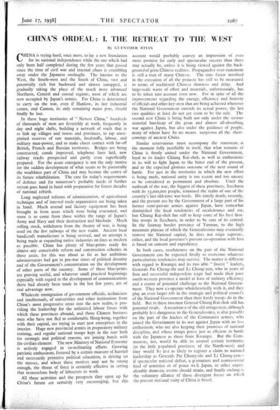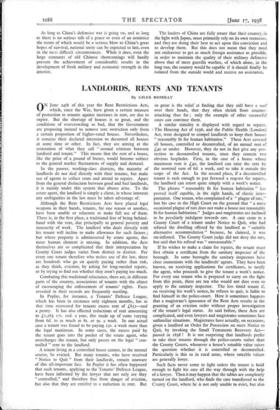CHINA'S ORDEAL : I. THE RETREAT TO THE WEST
By GUENTHER STEIN
CHINA is trying hard, once more, to lay a new foundation for its national independence while the one which had only been half completed during the few years that passed since the time of civil war and internal chaos is crumbling away under the Japanese onslaught. The interior to the West, the South-west and the South of China, vast and potentially rich but backward and almost untapped, is gradually taking the place of the much more advanced Northern, Central and coastal regions, most of which are now occupied by Japan's armies. For China is determined to carry on the war, even if Hankow, its last industrial centre, and Canton, its only remaining major port, should finally be lost.
In these huge territories of " Newest China," hundreds of thousands of men are feverishly at work, frequently in day and night shifts, building a network of roads that is to link up villages and towns and provinces, to tap unex- ploited reserves of raw materials, foodstuffs, labour, and military man-power, and to make closer contact with far-off British, French and Russian territories. Bridges are being constructed, canals improved, telephone lines laid, new railway tracks prospected and partly even superficially prepared. For the acute emergency is not the only motive for the sudden development of what seems to be potentially the wealthiest part of China and may become the centre of its future rehabilitation. The care for today's requirements of defence and for tomorrow's probable needs of further retreat goes hand in hand with preparation for future decades of national rebirth.
Long neglected reforms of administration, of agricultural technique and of internal trade organisation are being taken in hand. Much arsenal and factory equipment has been brought in from areas which were being evacuated, and more is to come from those within the range of Japan's Army and Navy and their destruction and blockade. Much rolling stock, withdrawn from the theatre of war, is being used on the few railways of the new realm. Ancient local handicraft manufacture is being revived, and an attempt is being made at expanding native industries on lines as modern as possible. China has plenty of blue-prints ready for almost any conceivable reform and construction schemes in these areas, for this was about as far as her ambitious administrators had got in pre-war times of political disunity and of the Government's concentration on the development of other parts of the country. Some of these blue-prints are proving useful, and whatever small practical beginnings especially with regard to the development of communications there had already been made in the last few years, are of real advantage now.
Wholesale immigration of government officials, technicians and intellectuals, of universities and other institutions from China's most progressive areas into the new realm, is pro- viding the leadership for the unlimited labour forces with which these provinces abound, and those Chinese business men who have not fled to comfortable Hong-kong, together with their capital, are trying to start new enterprises in the interior. Huge new provincial armies in preparatory military training, and regular national troops kept in the rear both for strategic and political reasons, are joining hands with the civilian element. The new Ministry of National Economy is actively engaged in co-ordinating efforts. Growing patriotic enthusiasm, fostered by a certain measure of hurried and necessarily primitive political education, is driving on the masses, and where these motives majr not be strong enough, the threat of force is certainly effective in setting that tremendous body of labourers to work.
All these activities and the prospects they open up for China's future d re certainly very encouraging, but this account would probably convey an impression of even more promise for early and spectacular success than there may actually be, unless it is being viewed against the back- ground of grim Chinese realities. Propagandist over-statement is still a trait of many Chinese. The time factor involved in the execution of all the projects has still to be measured in terms of traditional Chinese slowness and delay. And large-scale waste of effort and materials, unfortunately, has to be taken into account even now. For in spite of all the improvements regarding the energy, efficiency and honesty of officials and other key-men that are being achieved wherever the National Government extends its actual power, the last two qualities at least do not yet seem to be the rule. The second new China is being built not only under the serious material handicap of the great and almost all-absorbing war against Japan, but also under the guidance of people, many of whom have by no means outgrown all the short- comings of ancient China.
Similar reservatious must accompany the statement, at the moment fully justifiable in itself, that what remains of China is firmly united under the National Government, loyal to its leader Chiang Kai-shek, as well as enthusiastic in its will to fight Japan to the bitter end of the present, and to the expected glorious outcome of the next round of battle. For just in the territories in which the new effort is being made, national unity is too recent and too uneasy to be considered as permanent and absolute. Until the outbreak of the war, the biggest of these provinces, Szechuen with its 53,000,000 people, remained the realm of one of the country's last old-time war-lords. His timely death, recently, and the present use by the Government of a large part of his former semi-private armies against Japan, have somewhat diminished the local tendencies of recalcitrance and rot, but Chiang Kai-shek has still to keep some of his best first- line troops in Szechuen, in order to be sure of its control. In the faraway border province of Yunnan, to the high mountain plateau of which the Generalissimo may eventually remove the National capital, he does not reign supreme, either, and the local governor's present co-operation with him is based on consent and expediency.
In both cases, resoluteness on the part of the National Government can be expected finally to overcome whatever particularistic tendencies may survive. The matter is different with regard to Kwangsi and its two able " fascist " leaders,. Generals Pai Chung-shi and Li Chung-yen, who in years of firm and successful independent reign had made their poor south-western province a model at least of military efficiency and a centre of potential challenge to the National Govern- ment. They now co-operate wholeheartedly with it, and they play an even larger role in the strategic and political councils of the National Government than their hardy troops do in the field. But in these two men General Chiang Kai-shek still has potential rivals. A recurrence of the old antagonism, although probably less dangerous to the Generalissimo, is also possible on the part of the leaders of the Communist armies, who joined the Government in its war against Japan with no less, enthusiasm, who are also keeping their promises of national discipline, and whose troops prove just as efficient in battle with the Japanese as those from Kwangsi. But the Com- munists, too, would be able to control certain territories (in the little populated provinces of the North-west) and they would be just as likely to register a claim to national leadership as Generals Pai Chung-shi and Li Chung-yen- if spectacular national defeat, a p:emature and controversial kind of armistice or of peace wi.h Japan, or other unpre- dictable domestic events should strain, and finally endangr, the voluntary alliance of those divergent forces on which the present national unity of China is based. As long as China's defensive war is going on, and as long as there is no serious talk of a peace or even of an armistice the terms of which would be a serious blow to China's great hopes of survival, national unity can be expected to last, even in the mcst difficult circumstances. While it does, even the large remnants of old Chinese shortcomings will hardly prevent the achievement of considerable results in the development of fresh military and economic strength in the interior. The leaders of China are fully aware that their country, in the fight with Japan, must primarily rely on its own resources, and they are doing their best to act upon this conviction and to develop them. But this does not mean that they need not endeavour to get as much foreign assistance as possible, in order to maintain the quality of their military defensive above that of mere guerilla warfare, of which alone, in the long run, the country would be capable if it should finally be isolated from the outside world and receive no assistance.



















































 Previous page
Previous page